
-
The Treasures of the Korean Countryside
Filipp Vladimirovich Stoliarov
Those of you considering or already in the process of coming to South Korea to teach English will inevitably come across an interesting discussion that carries significant and practical consequences. That is, where do you expect and/or hope to be placed and more importantly, what are the differences between urban and rural placements.
From my experience, many of you will openly seek to be placed in large cities or the globally renowned metropolises of Seoul or Busan. Perhaps you believe that is where one can most effectively knit the professional and personal tapestry of memorable experiences. Urban areas, especially in Korea, are brimming with a vast convergence of unique and interconnected communities. This is a valid way of thinking about your decision regarding potential placement but it is only part of the limitless potential that awaits you in Korea.
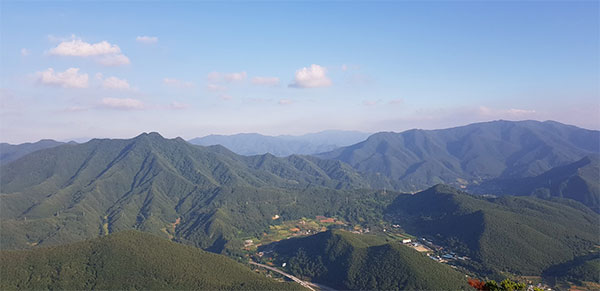
The forests and mountains of Gangwon-do.
In many global contexts, especially in reference to teaching and living conditions, urban and rural environments are often depicted in contrast through demonstrable factors such as access to infrastructure, social capital and most crucially for this line of work, pedagogical resources. However, you will find that Korea not only bucks this assumption but it demonstrates that your potential countryside placement can offer a uniquely fulfilling lifestyle while highlighting how pastoral and citified areas have entirely individual, self-sustaining and complementary characters.
Teaching is about learning but also, at times, unlearning. This applies to any preconceptions you may have about the possible limitations existing in rural towns. Almost every place in Korea, irrespective of its size or density will provide a remarkable balance of having the same technological luxuries as an urban environment and offering quick and easy access to any transport node should you seek travel to other cities or locations. The difference, however, is that your countryside town will exist amidst a verdant natural environment of unparalleled splendor. You will find yourself having access to Korea’s legendary internet and data speeds in the palm of your hand while exploring and capturing a cornucopia of forests, mountains, sacred temples and many of Korea’s incredible landmarks, all within quick travel from your home or school.
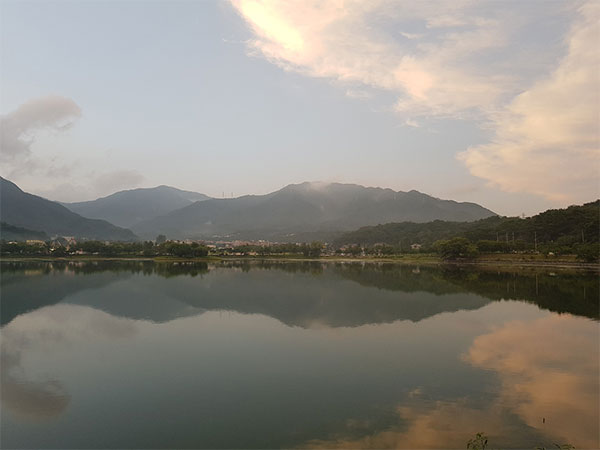
The stunning views of the countryside.
As each season announces their presence, the complete transformation of your environment emphasizes the scale and beauty of your surroundings. The lusciously green mountainous jungles of the summer and spring give way to the rich palette of colourful autumnal change. Only to then witness a whole new world emerge as the snows blanket your town and transform it into a winter wonderland. And for the more active amongst us, your rural placement will often mean having closer proximity to some of Korea’s world-famous skiing and snowboarding resorts, often no further than a bus ride away.
And this is just the start. From your first moment of arrival, unlike that of a busy city, you are not just a name amidst a sea of faces. In these countryside towns, you will form close connections with almost every avenue of human experience you encounter as you serve on the frontlines of being a linguistic and cultural ambassador. Your co-teachers and students will be more of a familiar presence when sharing the same surroundings. Your days will be filled with greetings and smiles as you and the town go about your daily routine. If you seek the sort of immersion that you believe is vital for learning, living and teaching within Korea then you will find the rural experience to be first among equals in providing an invaluable source of cultural, historical, interpersonal and professional development.
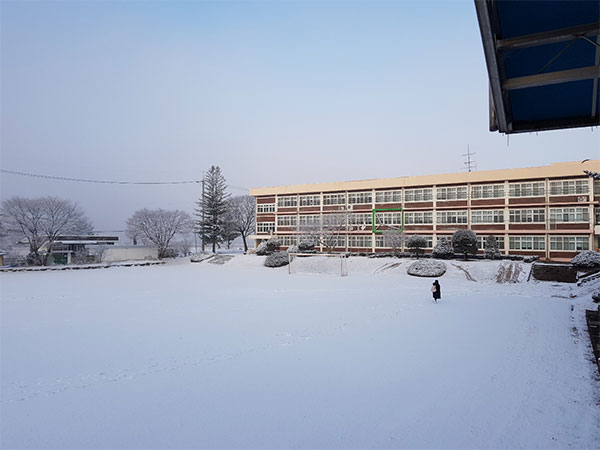
The winter wonderland school.
When I arrived in Korea for my first time in the chilly February of 2018, amidst the global spotlight and fanfare of the Pyeongchang Winter Olympics, the omnipresent excitement and marvel defined each moment as I took in my surroundings. Before my orientation commenced, I had extensively researched the province I was allocated. Coming from South Africa as a high school teacher, I believe that being a part of a close-knit community is the bedrock for both successful teaching and a satisfying life and so I wanted to know as much as possible about my soon-to-be second home.
After our EPIK orientation, I discovered my precise placement. Nestled amidst the forest-laden mountains on the Southern border of Gangwon-do, my new home was in a remarkably beautiful farming-based town of roughly five thousand people. Naturally, a slight degree of anxiety inhibited my senses as I braced myself to meet my co-teacher and see where my next year (and possibly more) would be spent. Almost immediately after meeting her, all my worries fell away as the kind, helpful and curious demeanor of my Korean co-teacher matched the level of energy and enthusiasm I had for new my environment. Since that moment, I am now in my third year teaching in Korea, still in the same town I had arrived in, working at four different schools. Each moment since arriving here has been an unending source of holistic growth and countless unforgettable memories.
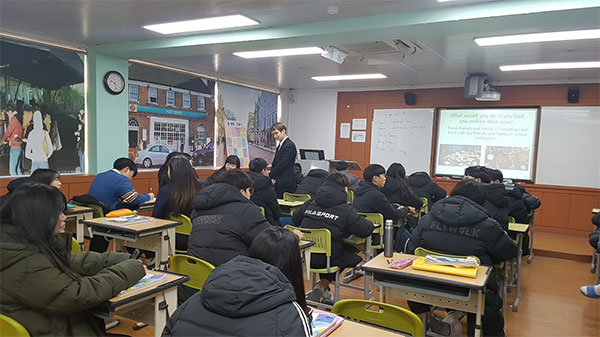
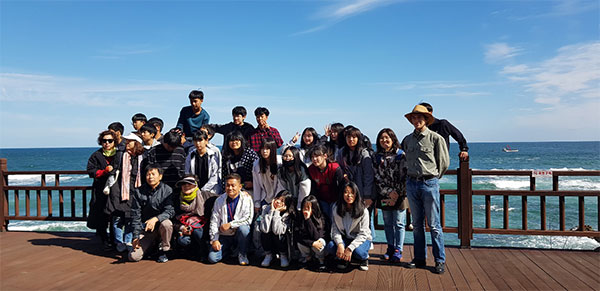
The community you develop with your co-teachers and students.
The educational aspect of the Korean countryside is where the real pay-off comes in. As mentioned earlier, Korea’s rural schools are equipped with just as many resources and technology as their urban counterparts. For the aspiring or experienced pedagogues, you will have all the necessary tools to ensure that your teaching objectives are optimally fulfilled. Schools will be equipped with world-class technology in each classroom allowing you to formulate and present engaging and interesting multimedia-based lessons. Over and above all these availabilities, the biggest asset in your classes will be your co-teacher and students.
Many of the students in the countryside will not have as much exposure to the English language or the multiple cultures stemming from it. As a result, lessons with your students will be fundamental in shaping their perceptions and potential for future engagement with English and foreign languages as a whole. You will have a critical role in ensuring that your content and teaching style facilitates a direct interest and motivation to pursue English beyond the classroom. Korean students reflect their society’s commitment to education from a young age and if you have what it takes to be an effective and inspiring teacher, it will not be long before you are lost in a flurry of constructive communication as your students begin to practice and master the language through the combined efforts of you and your Korean co-teacher. And as you witness their minds learning and utilizing the language, so your life in the town begins to evolve as your daily greetings on the street become engaging conversations. The growth of your students reflected within your interactions of where you live.
So what exactly can one expect from a rural teaching experience? Everything and anything. The reality is that your time in Korea will be fundamentally enriching no matter where you end up. However, it is in the countryside where you can have a chance to live the best of multiple dynamics. You will have all the access to Korea’s incredibly interconnected infrastructure and technological services while being immersed in a splendid natural environment that provides endless stimulation and opportunities for exploration and discovery. There are limitless treasures to be experienced during your time teaching in Korea, but you may well find that the crown jewel exists in the countryside.
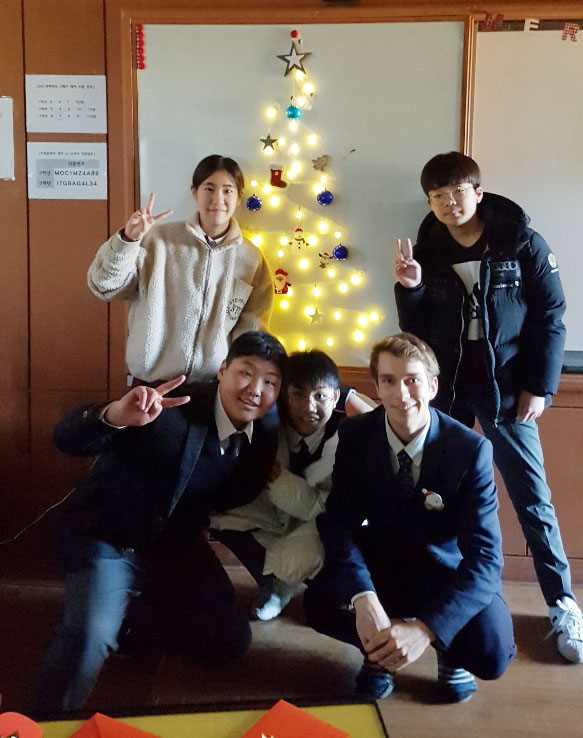
Learn and grow together.
English Program in Korea(EPIK), Teach and Learn in Korea(TaLK)
National Institute for International Education Ministry of Education, Republic of Korea
191 Jeongjail-ro, Bundang-gu, Seongnam-si, Gyeonggi-do, 13557 Korea Tel : +82-2-3668-1400 Fax: +82-2-764-1328
National Institute for International Education Ministry of Education, Republic of Korea
191 Jeongjail-ro, Bundang-gu, Seongnam-si, Gyeonggi-do, 13557 Korea Tel : +82-2-3668-1400 Fax: +82-2-764-1328


